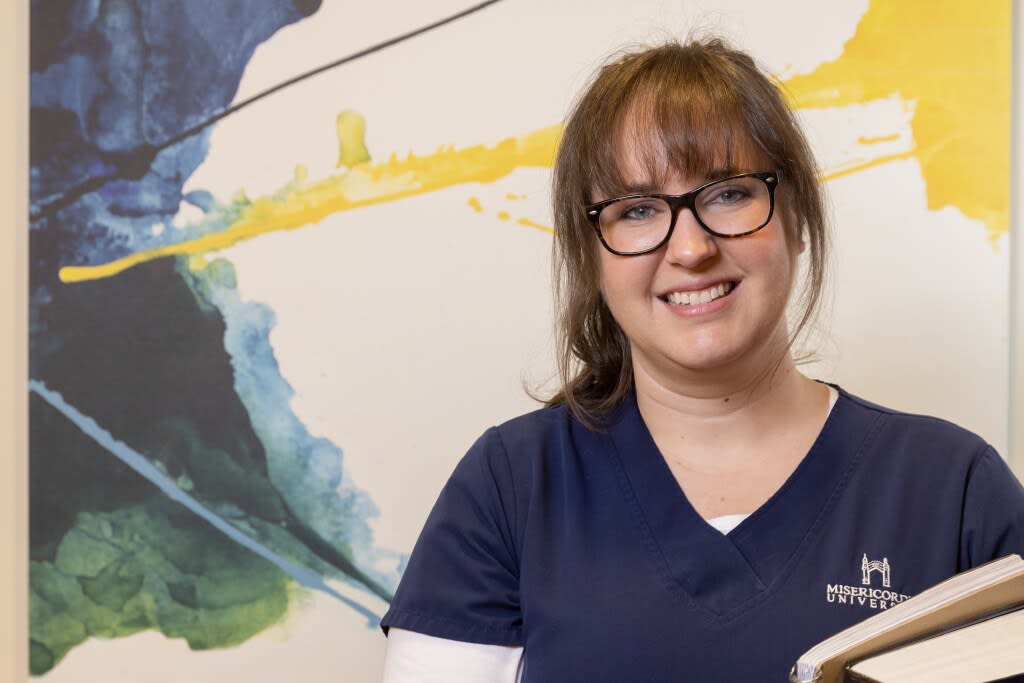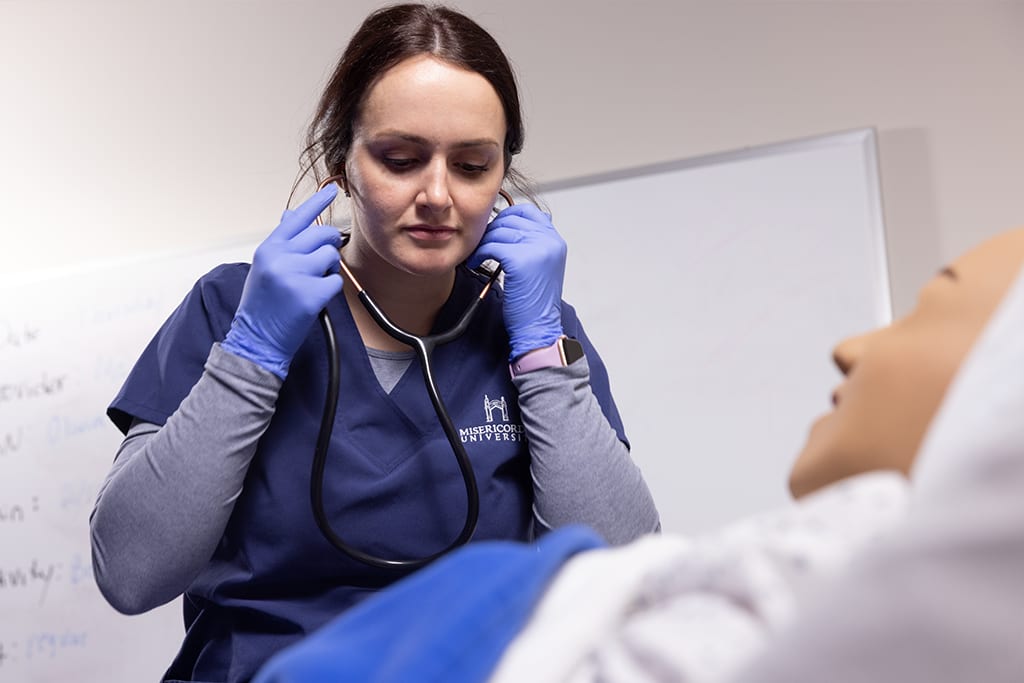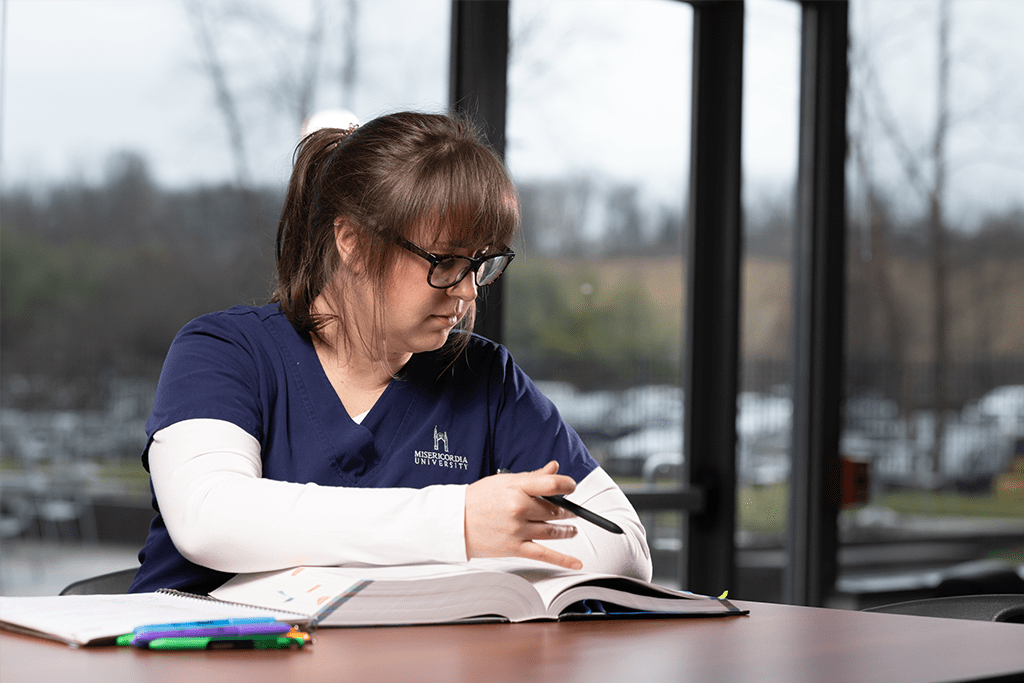How to Get Into an Accelerated Nursing Program
Each blog post is dated and contains accurate information as of that date. Certain information may have changed since the blog post publication date. If you would like to confirm the current accuracy of blog information, please visit our ABSN overview page or contact admissions at (866) 885-6337.
Getting into an accelerated nursing program takes commitment to the calling to become a nurse, plenty of preparedness, and a commitment to present yourself in the best possible light as you complete prerequisites as well as other steps during the application process.

Getting into an accelerated nursing program is completely attainable if you not only have the passion to become a nurse, but also the qualifications to apply to an accelerated program. One of the most popular accelerated nursing school paths is an Accelerated Bachelor of Science in Nursing (ABSN) program. Accelerated BSN programs allow you to leverage your existing college credits or non-nursing degree so you can become a nurse in less than two years.
As you begin to research whether an accelerated nursing program is right for you, it is important to find out how these accelerated nursing programs work. For example, Misericordia University’s accelerated nursing program in Pittsburgh, Pennsylvania, offers a BSN degree in as few as 16 months to qualified students. But do not let the timeframe be the only reason to apply. You also must ask yourself four very important questions. Your answers will help you determine if getting into an accelerated nursing program is an option for you.
It Can Be Hard to Get Into an Accelerated Nursing Program
Choosing a career in nursing takes a very selfless, compassionate, and determined person. That’s why one of the first qualities an accelerated nursing student should possess is a passion for the field. It is hard to get into an accelerated nursing program and succeed as a student, so remaining passionate about nursing and helping others will be an important element to rely on. Not only will this passion help drive you through the application process, but also the toughest parts of an accelerated nursing program. Why you want to become a nurse will also be among the first questions you will be asked when inquiring about Misericordia’s ABSN program.
Whether you are choosing the path because it has always been a calling, or because of a family member who became ill, knowing why you want to pursue a career as a nurse is very important as you start planning your path.
Accelerated nursing programs are not a place for students who are unsure about entering this challenging-yet-rewarding health care field. That is why having a clear reason about why you want to begin this journey is essential before you even apply to an ABSN program.
How to Prepare for a Nursing School Interview
Why you want to become a nurse is just one question that will likely come up in your nursing school interview. Read about some other common questions your Misericordia ABSN admissions counselor may ask you — and other frequently asked questions about this initial admissions call — in this blog post that guides you through the nursing school interview process.
Qualifications You Need to Apply to Nursing School
You have the passion. You possess the character traits. But do you have the qualifications needed to get into an Accelerated BSN program, like Misericordia University’s?
Here are the admissions requirements for the 16-month ABSN program in Pittsburgh:
- Hold a non-nursing bachelor’s degree or have completed a minimum of 60 credits from a regionally accredited institution.
- Have a minimum cumulative GPA of 2.75 (based on all transferable credit).
- Complete all prerequisite courses within the specified grade requirements.
You may have noticed that unlike some other accelerated nursing programs, you DO NOT need to have a background in nursing or a completed bachelor’s degree to qualify to enroll in the Misericordia ABSN program. However, you still need to have the GPA for nursing school in addition to meeting other student qualifications. One of our admissions counselors can walk you through the process of getting into an accelerated nursing program if you’re curious about how to transfer a non-nursing degree or college credits to a BSN program like ours.

Getting Into an Accelerated Nursing Program: FAQs
1. How can I increase my chances of getting into accelerated nursing school?
Good grades are only one part of the equation when it comes to getting into nursing school. Knowing why you want to become a nurse and understanding admission qualifications, among other elements, are all part of the equation if you want to successfully apply. For more information, one of Misericordia ABSN’s admissions counselors shares six ways you can make yourself stand out as a nursing school candidate in this blog post about increasing your chances of getting into an accelerated nursing program.
2. What accelerated nursing program prerequisites do I need to complete?
Due to the accelerated nature of Misericordia’s ABSN program, students need to have a firm academic foundation in order to take on the 16-month curriculum and succeed. If you want to be accepted into the Misericordia ABSN program as a nursing student, you must have first completed a series of accelerated nursing program prerequisites. Our required prerequisites are split into two categories: science prerequisites, totaling 15 credits, and general prerequisites, totaling 12 credits. Several prerequisites must have been completed within 7 years of your enrollment date to still be valid, and all must be completed with a “C” grade or higher. Visit our prerequisites page for more information as you prepare to apply.
3. How important is GPA for nursing school?
Several admissions criteria need to be met in order to enroll as an accelerated nursing student, and cumulative GPA is among the most important requirements. Your GPA for nursing school with Misericordia’s ABSN program must be a cumulative 2.75 based on all transferable credits, and if you have not reached this GPA then you will not be accepted as a Misericordia nursing student. Contact an admissions counselor if you have any questions about your qualifications for the program, and they will be able to help you evaluate your options.
What You Do Not Need to Do in Order to Apply to Misericordia
Misericordia’s 16-month ABSN program has a certain set of admissions requirements in order to successfully enroll as a student, with more information able to be found here. However, while Misericordia’s admissions criteria are designed to only accept students who are likely to succeed in the program, we have also eliminated several common requirements that we do not view as relevant. This streamlining has removed additional barriers to admission, and lets students go through the application process more easily than with many accelerated nursing programs.
You don’t have to take the TEAS
The TEAS, or the Test of Essential Academic Skills, is a standardized multiple-choice test that most nursing schools use to evaluate whether potential students are likely to be a good fit for the program and should be accepted. Misericordia functions differently. Due to our core curriculum requirements, GPA requirements, and necessary prerequisite courses, we believe that the students who meet our admissions criteria have already demonstrated that they are a good academic fit for the program.

Students who take the TEAS have to spend a considerable amount of time, effort and money on the test with fees and study materials, and waiting to take the test means a slower route toward becoming a nurse. Misericordia has left this test out of our admissions process so that our applicants can reach an admissions decision as easily as possible.
You don’t have to complete a nursing school essay
Application essays are a longstanding, and often disliked, part of the nursing school admissions process. These essays are meant to allow the nursing school admissions team to look past the applicant’s academic qualifications and evaluate their motivations behind wanting to become a nurse. Finding a student’s “why” is an important part of the decision to accept them, but we have found application essays to be unnecessary due to our excellent admissions counselors.
What could have been accomplished by an application essay, we accomplish with a personalized chat during the admissions process. At the beginning of the process, each applicant will have time to speak with an admissions counselor and define their “why” as well as examine their other qualifications and any other points of interest throughout their admissions journey. For students who may be tired of (or anxious about) an essay as an additional barrier to entry, substituting a personalized conversation emphasizes the individualized attention that student will receive as a Misericordia nursing student.
Nursing Student Qualities That Will Help You During the Admissions Process (And Beyond)
There are some universal traits, like compassion and selflessness, that any nurse or nursing student will need in order to work and succeed in the field. However, there are additional qualities that nursing students can use to stand out. As nurse educators determined in an academic study, the five most significant identifying traits of a successful nursing student are:
- Preparedness
- Critical thinking
- Effective communication
- Positive attitude
- Adaptability
Why are the above five characteristics so important to have during your accelerated nursing application, and how can they help you as a student? Let’s go through each of them and how they apply to the process of applying to nursing schools.

1. Preparedness
Being prepared means being organized and ready to take on the next step of whatever you do. This is relevant to your nursing school application, as you will need to have your materials ready and sent in according to application deadlines. Losing important documentation or forgetting to send something in can ruin an application, so by being prepared in your application, you are preparing for success.
2. Critical thinking
Critical thinking is one of the most essential skills a nursing student can have. In the ABSN program’s clinical settings, this will allow you to be more attentive and ready to problem-solve at all times, but it can also help during the admissions process. With critical thinking, you can identify the best start date for you and find solutions to any admissions issue with help from your admissions counselor.
3. Effective communication
Communication is key for successful nursing student applicants, as you must be able to communicate with your admissions counselor effectively. Share your “why” when you speak with them, and let them know that you are serious about your education by replying and reaching out in a timely manner throughout the admissions process. You will need to communicate with your cohort, your instructors, your clinical nurse, and actual patients, so show that this is a strength when you apply and you will be more likely to be accepted.
4. Positive attitude
Keeping a positive attitude is key throughout the nursing school search. You will probably face rejection along the way, but know that if you remain driven you will be able to find an accelerated program that works for you. Don’t back down from the search and maintain a positive attitude, and you will be able to find the nursing education you’re looking for.
5. Adaptability
Being able to accept constructive feedback and apply that to your nursing education is extremely important. If you need to take more courses to meet program requirements, or retake a prerequisite course that can no longer transfer, remain adaptable and know that you’re being advised on actions that are in your own best interest as a student. Be ready to do whatever it takes, and your adaptability will pay off in the long run.

Are You Ready To Begin an Accelerated Program?
The last question you have to answer is, are you ready? If you have answered ‘yes’ to all of the questions above, then it is time to start your journey toward earning a Bachelor of Science in Nursing degree. The easiest part of getting into an accelerated nursing program is making the first move. Contact an admissions counselor today and he or she will help you make a plan to start the Misericordia ABSN program.
